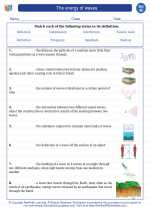Surface Tension
Surface tension is the property of a liquid that allows it to resist an external force due to the cohesive nature of its molecules. It is what causes the surface of a liquid to behave like a stretched elastic membrane.
Causes of Surface Tension
Surface tension is caused by the cohesive forces between the molecules of the liquid. These forces are attractive forces between the molecules that tend to pull the molecules together. At the surface of the liquid, the molecules are not surrounded by other molecules on all sides, so the cohesive forces pull them inward, creating a tension at the surface.
Effects of Surface Tension
Surface tension has several important effects, including:
- Capillary Action: The ability of a liquid to flow in narrow spaces or against gravity, such as the rise of water in a narrow tube (capillary).
- Formation of Drops: The tendency of liquids to form spherical drops, as seen in raindrops or water droplets on a leaf.
- Insect Walking on Water: Some insects can walk on the surface of water due to the surface tension of water.
Measurement of Surface Tension
Surface tension is measured in units of force per unit length, such as newtons per meter (N/m) or dynes per centimeter (dyn/cm).
Factors Affecting Surface Tension
Several factors can affect the surface tension of a liquid, including:
- Temperature: Surface tension generally decreases with an increase in temperature.
- Presence of Impurities: Surface tension may decrease in the presence of impurities or surfactants.
- Type of Liquid: Different liquids have different surface tensions based on the strength of their cohesive forces.
Applications of Surface Tension
Surface tension has numerous practical applications, including:
- Soap Bubbles: The surface tension of soapy water allows the formation of bubbles.
- Use in Medicine: Surface tension is important in processes such as the functioning of the alveoli in the lungs.
- Use in Engineering: Surface tension is utilized in various engineering processes, such as coating and printing.
Study Guide
To study surface tension, you should focus on the following key areas:
- Understanding the concept of cohesive forces and how they contribute to surface tension.
- Exploring the effects of surface tension on different phenomena, such as capillary action and the formation of drops.
- Learning about the factors that can affect surface tension and how it can be measured.
- Investigating the practical applications of surface tension in various fields.
By mastering these key areas, you will develop a comprehensive understanding of surface tension and its significance in the world around us.
.





